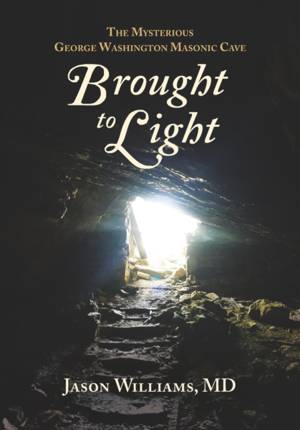
- Retrait gratuit dans votre magasin Club
- 7.000.000 titres dans notre catalogue
- Payer en toute sécurité
- Toujours un magasin près de chez vous
- Retrait gratuit dans votre magasin Club
- 7.000.0000 titres dans notre catalogue
- Payer en toute sécurité
- Toujours un magasin près de chez vous
Brought to Light
The Mysterious George Washington Masonic Cave
Jason WilliamsDescription
The George Washington Masonic Cave near Charles Town, West Virginia, contains a signature carving of George Washington dated 1748. Although this inscription appears authentic, it has yet to be verified by historical accounts or scientific inquiry. Like all great legends, there is probably a kernel of truth to the Cave-but so too is there likely an aura of embellishment that developed over time. This book painstakingly pieces together the chronicled events and real estate archives related to the cavern in order to sort out fact from fiction.
George Washington, the man, is justly remembered for his talents on the battlefield, in political arenas, and on his tobacco farms. He was also a smart surveyor and, by his own written account, a speleologist (that is, an explorer of caves). The Masonic Cave conveniently connects all of these fascinating chapters in the life story of Washington; through it, we can better view the transformation that occurred over the decades of the Virginian's life. From his entrance into the secretive Masonic fraternity as a precocious teen to his associations with scores of captivating characters ranging from Lafayette to Lord Fairfax, to his worldly ambitions that became transmuted into something much bolder and universal, to his strong sense of guilt and remorse as a slaveowner (along with a desire to end that horrid practice), to his struggles with disease and his own mortality, many of the lesser-known aspects of Washington's life are covered herein. Washington's biography is one of the most inspiring in American history. Meandering the dark passageways of the Cave brings us to an even closer appreciation of why that is so.
Jason Williams, MD, grew up in California and Montana but now calls Virginia's Shenandoah Valley home. He is a board-certified psychiatrist who trained at Johns Hopkins Hospital and has subspecialty training in psychosomatic medicine. He is also a proud father of three young adults. As an intrepid, independent scholar of largely forgotten history, Dr. Williams staunchly believes studying the past can lead to personal development and growth, which empowers our collective future.
Research findings elucidated in Brought to Light include:- George Washington entered the Cave on multiple occurrences, and it was a place of some importance to him.
- Young Washington personally surveyed the land historically attached to the Cave. But due to an oversight on his part, the survey has wholly been neglected (until now).
- Circumstantial evidence suggests the Cave was used for Masonic meetings by Washington, two of his brothers, and other close allies. The men-a group of nine-purchased the Cave shortly before the Revolutionary War. These same Cave owners went on to become significant instigators in America's rebellion.
- Generals and other officers in Washington's army stopped by the Cave during the Revolutionary War, suggesting it may have served as an unofficial meeting place far from the battlefields but at hand to Washington's closest confidants and brothers (both biological and fraternal).
- While there is no direct or circumstantial evidence the "G Washington 1748" carving on the Cave's back wall is genuine, there are logical reasons why it may be.
- The Cave was discreetly handed down through the bloodline of a forgotten godson of George Washington during the 1800s. Letters connecting the Cave to the Washington family at Mount Vernon have been located.
- A bespoke relic that belonged to George Washington is tied to the Cave and the local Freemasons. Once thought to be lost but recently "rediscovered," this national treasure highlights the entire narrative of Washington's associations with the ancient fraternity and his quest for a democratic republic instilled with civil liberties, especially religious freedom.
This is the greyscale edition.
Spécifications
Parties prenantes
- Auteur(s) :
- Editeur:
Contenu
- Nombre de pages :
- 618
- Langue:
- Anglais
Caractéristiques
- EAN:
- 9781637237120
- Date de parution :
- 17-09-21
- Format:
- Livre broché
- Format numérique:
- Trade paperback (VS)
- Dimensions :
- 178 mm x 254 mm
- Poids :
- 1056 g

Les avis
Nous publions uniquement les avis qui respectent les conditions requises. Consultez nos conditions pour les avis.






